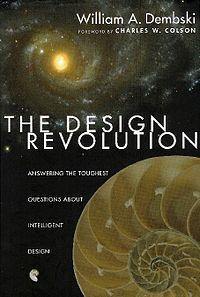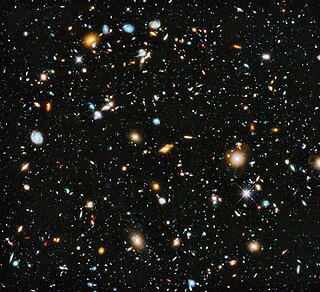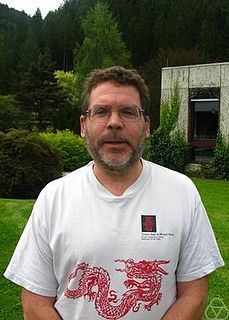Phillip E. Johnson is a retired UC Berkeley law professor, opponent of evolutionary science, co-founder of the pseudo-scientific intelligent design movement, author of the "Wedge strategy" and co-founder of the Discovery Institute's Center for Science and Culture (CSC). He has described himself as "in a sense the father of the intelligent design movement". He is a critic of Darwinism, which he has described as "fully naturalistic evolution, involving chance mechanisms and natural selection". The wedge strategy aims to change public opinion and scientific consensus, and seeks to convince the scientific community to allow a role for theism, or causes beyond naturalistic explanation, in scientific discourse. Johnson has argued that scientists accepted the theory of evolution "before it was rigorously tested, and thereafter used all their authority to convince the public that naturalistic processes are sufficient to produce a human from a bacterium, and a bacterium from a mix of chemicals."
John Corrigan "Jonathan" Wells is an American biologist, author, and advocate of the pseudoscientific argument of intelligent design. Wells joined the Unification Church in 1974, and subsequently wrote that the teachings of church founder Sun Myung Moon, his own studies at the Unification Theological Seminary and his prayers convinced him to devote his life to "destroying Darwinism." The term Darwinism is often used by intelligent design proponents and other creationists to refer to the scientific consensus on evolution. He gained a PhD in religious studies at Yale University in 1986, then became Director of the Unification Church’s inter-religious outreach organization in New York City. In 1989, he studied at the University of California, Berkeley, where he earned a PhD in molecular and cellular biology in 1994. He became a member of several scientific associations and has published in academic journals.

The intelligent design movement is a neo-creationist religious campaign for broad social, academic and political change to promote and support the pseudoscientific idea of intelligent design (ID), which asserts that "certain features of the universe and of living things are best explained by an intelligent cause, not an undirected process such as natural selection." Its chief activities are a campaign to promote public awareness of this concept, the lobbying of policymakers to include its teaching in high school science classes, and legal action, either to defend such teaching or to remove barriers otherwise preventing it. The movement arose out of the creation science movement in the United States, and is driven by a small group of proponents.

Specified complexity is a concept proposed by William Dembski and used by him and others to promote the pseudoscientific arguments of intelligent design. According to Dembski, the concept can formalize a property that singles out patterns that are both specified and complex, where in Dembski's terminology, a specified pattern is one that admits short descriptions, whereas a complex pattern is one that is unlikely to occur by chance. Proponents of intelligent design use specified complexity as one of their two main arguments, alongside irreducible complexity.

The Michael Polanyi Center(MPC) at Baylor University, Texas, was the first center at a research university exclusively dedicated to the principle of intelligent design, primarily to host William Dembski, its director, and Bruce L. Gordon, its assistant director. It was founded in 1999 by Baylor president Robert B. Sloan "with the primary aim of advancing the understanding of the sciences" in a religious context and was named for Michael Polanyi. It was aligned with the Discovery Institute's wedge strategy, and was funded in part by a grant from the John Templeton Foundation via the Discovery Institute. All of the center's research investigated the subject of intelligent design. It hosted a conference in April 2000 that brought the center to the attention of the broader Baylor community as well as the rest of the scholarly world.

Intelligent Design: The Bridge Between Science and Theology is a 1999 book by William A. Dembski, in which the author presents an argument in support of intelligent design. Dembski defines the term "specified complexity", and argues that instances of it in nature cannot be explained by Darwinian evolution, but instead are consistent with the intelligent design. He also derives an instance of his self-declared law of conservation of information and uses it to argue against Darwinian evolution. The book is a summary treatment of the mathematical theory he presents in The Design Inference (1998), and is intended to be largely understandable by a nontechnical audience. Dembski also provides a Christian theological commentary, and analysis of, what he perceives to be the historical and cultural significance of the ideas.

The Wedge Strategy is a creationist political and social action plan authored by the Discovery Institute, the hub of the pseudoscientific intelligent design movement. The strategy was put forth in a Discovery Institute manifesto known as the Wedge Document. Its goal is to change American culture by shaping public policy to reflect politically conservative fundamentalist evangelical Protestant values. The wedge metaphor is attributed to Phillip E. Johnson and depicts a metal wedge splitting a log.
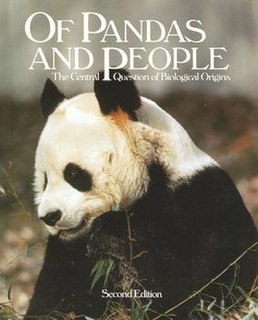
Of Pandas and People: The Central Question of Biological Origins is a controversial 1989 school-level textbook written by Percival Davis and Dean H. Kenyon and published by the Texas-based Foundation for Thought and Ethics (FTE). The textbook endorses the pseudoscientific concept of intelligent design—namely that life shows evidence of being designed by an intelligent agent which is not named specifically in the book, although proponents understand that it refers to the Christian God. The overview chapter was written by young Earth creationist Nancy Pearcey. They present various polemical arguments against the scientific theory of evolution. Before publication, early drafts used cognates of "creationist", after the Edwards v. Aguillard Supreme Court ruling that creationism is religion and not science, these were changed to refer to "intelligent design". The second edition published in 1993 included a contribution written by Michael Behe.

An intelligent designer, also referred to as an intelligent agent, is the hypothetical willed and self-aware entity that the intelligent design movement argues had some role in the origin and/or development of life. The term "intelligent cause" is also used, implying their teleological supposition of direction and purpose in features of the universe and of living things.

The Kansas evolution hearings were a series of hearings held in Topeka, Kansas, United States from May 5 to 12, 2005 by the Kansas State Board of Education and its State Board Science Hearing Committee to change how evolution and the origin of life would be taught in the state's public high school science classes. The hearings were arranged by the Board of Education with the intent of introducing intelligent design into science classes via the Teach the Controversy method.
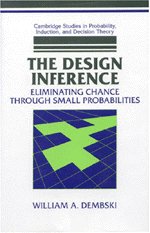
The Design Inference: Eliminating Chance through Small Probabilities is a 1998 book by American philosopher and mathematician William A. Dembski, a proponent of intelligent design, which sets out to establish approaches by which evidence of intelligent agency could be inferred in natural and social situations. In the book he distinguishes between 3 general modes of competing explanations in order of priority: regularity, chance, and design. The processes in which regularity, chance, and design are ruled out one by one until one remains as a reasonable and sufficient explanation for an event, are what he calls an "explanatory filter". It is a method that tries to eliminate competing explanations in a systematic fashion including when a highly improbable event conforms to a discernible pattern that is given independently of the event itself. This pattern is Dembski's concept of specified complexity. Throughout the book he uses diverse examples such as detectability of spontaneous generation and occurrence of natural phenomena and cases of deceit like ballot rigging, plagiarism, falsification of data, etc.

Darwinism, Design and Public Education is a 2003 anthology, consisting largely of rewritten versions of essays from a 1998 issue of Michigan State University Press's journal, Rhetoric and Public Affairs, edited by intelligent design activists John Angus Campbell and Stephen C. Meyer, neither of whom are scientists. The book is promoted as being a "peer-reviewed science book", however in reviewing it Barbara Forrest notes that:

The Discovery Institute has conducted a series of related public relations campaigns which seek to promote intelligent design while attempting to discredit evolutionary biology, which the Institute terms "Darwinism." The Discovery Institute promotes the pseudoscientific intelligent design movement and is represented by Creative Response Concepts, a public relations firm.

This timeline of intelligent design outlines the major events in the development of intelligent design as presented and promoted by the intelligent design movement.

The relationship between intelligent design and science has been a contentious one. Intelligent design (ID) is presented by its proponents as science and claims to offer an alternative to evolution. The Discovery Institute, a politically conservative think tank and the leading proponent of intelligent design, launched a campaign entitled "Teach the Controversy" which claims that a controversy exists within the scientific community over evolution. The scientific community, however, rejects intelligent design as a form of creationism. The basic facts of evolution are not a matter of controversy in science.
